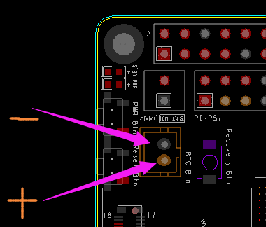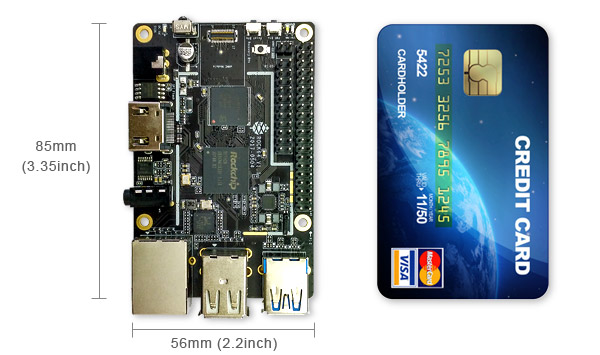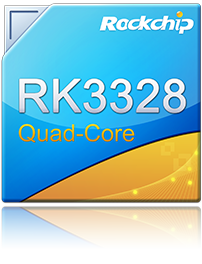Difference between revisions of "ROCK64"
(Moved information about SPI flash from system memory to storage (it is a board feature, not part of the SoC), corrected size (128Mbit, not 128MB), removed information about not being useful for booting) |
(remove mentions of old IRC server) |
||
| Line 235: | Line 235: | ||
== Other Resources == | == Other Resources == | ||
* [https://forum.pine64.org/forumdisplay.php?fid=85 ROCK64 Forum] | * [https://forum.pine64.org/forumdisplay.php?fid=85 ROCK64 Forum] | ||
* | * IRC Server: irc.pine64.org Channel: ROCK64 | ||
* [https://github.com/rock64-linux ROCK64 Linux GitHub Repo] | * [https://github.com/rock64-linux ROCK64 Linux GitHub Repo] | ||
* [https://github.com/ayufan-rock64 ROCK64 ayufan GitHub Repo] | * [https://github.com/ayufan-rock64 ROCK64 ayufan GitHub Repo] | ||
Revision as of 09:36, 17 June 2020
ROCK64
ROCK64 is a credit-card size 4K60P HDR Media Board Computer powered by Rockchip RK3328 Quad-Core ARM Cortex A53 64-Bit Processor and supports up to 4GB 1866MHz LPDDR3 memory. It provides an eMMC module socket, MicroSD Card slot, Pi-2 Bus, Pi-P5+ Bus, USB 3.0, and many other peripheral interfaces for makers to integrate with sensors and other devices. Many different Operating Systems (OS) are freely available from the open source community, such as Android 7.1, Debian, and Yocto.
ROCK64 Software Images
- OS build Installation Guide and tools:
ROCK64 Ver3 and Ver2
Under 'ROCK64 Software and OS Image Download Section' you will find a complete list of currently supported Operating System images that work with the ROCK64 as well as other related software. The list includes OS images and descriptions of:
 Armbian Ubuntu Bionic Desktop on mainline Kernel (microSD / eMMC Boot)
Armbian Ubuntu Bionic Desktop on mainline Kernel (microSD / eMMC Boot)  Armbian Debian Buster on mainline Kernel (microSD / eMMC Boot)
Armbian Debian Buster on mainline Kernel (microSD / eMMC Boot)
 Armbian Ubuntu Bionic Desktop on legacy BSP Kernel (microSD / eMMC Boot)
Armbian Ubuntu Bionic Desktop on legacy BSP Kernel (microSD / eMMC Boot)  Armbian Debian Buster on legacy BSP Kernel (microSD / eMMC Boot)
Armbian Debian Buster on legacy BSP Kernel (microSD / eMMC Boot)
 Bionic Desktop LXDE (microSD /eMMC Boot)
Bionic Desktop LXDE (microSD /eMMC Boot)  Bionic Minimal 64bit (microSD /eMMC Boot)
Bionic Minimal 64bit (microSD /eMMC Boot)
 Bionic Minimal 32bit (microSD /eMMC Boot)
Bionic Minimal 32bit (microSD /eMMC Boot)  Bionic Minimal Containers (microSD /eMMC Boot)
Bionic Minimal Containers (microSD /eMMC Boot)
 LibreElec for KODI (microSD / eMMC Boot)
LibreElec for KODI (microSD / eMMC Boot)
 Debian by ayufan (microSD / eMMC Boot)
Debian by ayufan (microSD / eMMC Boot)
 Debian by mrfixit2001 (microSD / eMMC Boot)
Debian by mrfixit2001 (microSD / eMMC Boot)
 OpenMediaVault 32bit (microSD / eMMC boot)
OpenMediaVault 32bit (microSD / eMMC boot)  OpenMediaVault 64bit (microSD / eMMC boot)
OpenMediaVault 64bit (microSD / eMMC boot)
 NextCloudPi(microSD /eMMC Boot)
NextCloudPi(microSD /eMMC Boot)
File:Netbsd2.png NetBSD (microSD / eMMC Boot)
 Android 8.x (eMMC)
Android 8.x (eMMC)  Android 8.x (microSD Boot)
Android 8.x (microSD Boot)
 Android 7.x (eMMC)
Android 7.x (eMMC)  Android 7.x (microSD Boot)
Android 7.x (microSD Boot)
 Android TV 7.x (eMMC)
Android TV 7.x (eMMC)  Android TV 7.x (microSD Boot)
Android TV 7.x (microSD Boot)
ROCK64 Ver2 only
Under 'ROCK64 Software and OS Image Download Section' you will find a complete list of currently supported Operating System images that work with the ROCK64 as well as other related software.
The list includes OS images and descriptions of:
 Manjaro KDE ARM (microSD /eMMC Boot)
Manjaro KDE ARM (microSD /eMMC Boot)  Manjaro LXQT ARM (microSD /eMMC Boot)
Manjaro LXQT ARM (microSD /eMMC Boot)
 Manjaro ARM Minimal (microSD /eMMC Boot)
Manjaro ARM Minimal (microSD /eMMC Boot)
 NEMS Linux (microSD /eMMC Boot)
NEMS Linux (microSD /eMMC Boot)
 Volumio Digital Audio Player (microSD /eMMC Boot)
Volumio Digital Audio Player (microSD /eMMC Boot)
Quick Links to the Source of OS Images Build
Some OS images are still in beta or nightly build which are only fit for testing purposes. These should usually be avoided for normal usage, since they are used at your own risk
- ayufan Linux
- ayufan Android 7.1
- Raybuntu LibreElec KODI | Kwiboo LibreElec KODI
- Fire219 Fedora
- Lakka | RetroPie-Setup
- Armbian
- Arch Linux
- NextCloudPi
- Slackware
State of software support for the hardware
| Requirement | GNU/Linux | Android/Linux | Kodi/Linux |
|---|---|---|---|
| 2160p 30Hz 8bit h264/h265/vp8 | partial? 1 | yes | yes |
| UI using GPU | no | yes | yes |
| Youtube | no | yes | no |
| vp9 / mpeg4 / mpeg2 / 10bit HDR / YCbCr | no | yes? | yes |
SoC and Memory Specification
- Based on Rockchip RK3328
CPU Architecture
- Quad-core Cortex-A53 up to 1.5GHz CPU
- Full implementation of the ARM architecture v8-A instruction set
- ARM Neon Advanced SIMD (single instruction, multiple data) support for accelerated media and signal processing computation
- ARMv8 Cryptography Extensions
- In-order pipeline with symmetric dual-issue of most instructions
- Unified system L2 cache
- Include VFP v3 hardware to support single and double-precision operations
- Integrated 32KB L1 instruction cache, 32KB L1 data cache with 4-way set associative
- TrustZone technology support
- Full CoreSight debug solution
- One separate power domains for CPU core system to support internal power switch and externally turn on/off based on different application scenario
- PD_A53: Cortex-A53 + Neon + FPU + L1 I/D Cache of core 2/3
- One isolated voltage domain to support DVFS
GPU Architecture
- ARM Mali-450MP2 Dual-core GPU
- OpenGL ES 1.1 and 2.0, OpenVG1.1
System Memory
- LPDDR3 RAM Memory Variants: 1GB, 2GB and 4GB.
Board Features
Video
- Digital Video output up to 4K@60Hz
- 4K HDR @ 60fps
- H.264/AVC Base/Main/High/High10 profile @ level 5.1; up to 4Kx2K @ 60fps
- H.265/HEVC Main/Main10 profile @ level 5.1 High-tier; up to 4Kx2K @ 60fps
- VP9, up to 4Kx2K @ 60fps
- MPEG-1, ISO/IEC 11172-2, up to 1080P @ 60fps
- MPEG-2, ISO/IEC 13818-2, SP@ML, MP@HL, up to 1080P @ 60fps
- MPEG-4, ISO/IEC 14496-2, SP@L0-3, ASP@L0-5, up to 1080P @ 60fps
- VC-1, SP@ML, MP@HL, AP@L0-3, up to 1080P @ 60fps
- MVC is supported based on H.264 or H.265, up to 1080P @ 60fps
Audio
- 3.5mm A/V Jack (Composite Video Output and RCA Stereo support using conversion cable)
Network
- 10/100/1000Mbps Ethernet
- WiFi 802.11 b/g/n with Bluetooth 4.0 (optional USB dongle)
Storage
- microSD - bootable, support SDHC and SDXC, storage up to 256GB
- eMMC - bootable (optional eMMC Module)
- 128Mbit (16MB) on-board SPI flash memory (empty by default) - bootable?
- 1 USB3.0 Dedicated Host port
- 2 USB2.0 Dedicated Host port (top one is USB-OTG)
Expansion Ports
- 2x20 pins "Pi2" GPIO Header
- 2x11 pins "Pi P5+" GPIO Header (with 2nd 10/100Mbps Ethernet pins)
ROCK64 Board Information, Schematics and Certifications
- Board Dimensions: 85mm x 56mm x 18.8mm
- Input Power: +5V @3A with 3.5mm/1.35mm Type H Barrel type DC connector (@2A still work if no heavy loading on USB 3.0 port)
- ROCK64 ver 3.0 SBC related info
 ROCK64 Rev3 SBC RTC Battery Connector polarity
ROCK64 Rev3 SBC RTC Battery Connector polarity
- ROCK64 ver 2.0 SBC related info
- Github on ROCK64 GPIO library, thanks to Leapo
- Good documentation about ROCK64 GPIO pins article
- ROCK64 Audio DAC with 10/100Mbps Ethernet POT Board Schematic
- ROCK64 3-D autodesk drawing, thanks and courtesy of TeaPack
- ROCK64 Certifications:
- Disclaimer: Please note that PINE64 SBC is not a "final" product and in general certification is not necessary. However, PINE64 still submits the SBC for FCC, CE, and ROHS certifications and obtain the certificates to prove that the SBC board can pass the testing. Please note, a final commercial product needs to perform its own testing and obtain its own certificate.
- ROCK64 FCC Certificate
- ROCK64 CE Certificate
- ROCK64 RoHS Certificate
Datasheets for Components and Peripherals
- Rockchip RK3328 SoC information:
- LPDDR3 (178 Balls) SDRAM:
- eMMC information:
- SPI NOR Flash information:
- Ethernet related info:
- Peripheral related info:
- Enclosure information:
- Remote control button mapping
Other Resources
- ROCK64 Forum
- IRC Server: irc.pine64.org Channel: ROCK64
- ROCK64 Linux GitHub Repo
- ROCK64 ayufan GitHub Repo
- Rockchip Linux GitHub Repo
- Rockchip Android RKMC (Forked from Kodi 16.1)
- Rockchip Open Source Wiki
- ROCK64 Guides
- Armbian's ROCK64 Page









